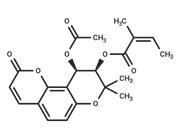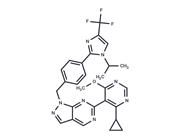| Name | CD437 |
| Description | CD437 (AHPN) is a specifc Retinoic Acid Receptor γ (RARγ) agonist. |
| Cell Research | For morphological analysis, cells are treated with 10 μM CD437, trypsinized, washed with phosphate-buffered saline (PBS), fixed with 3.7% paraformaldehyde, and stained with 50 μg of 4,6-diamidino-2-phenylindole (DAPI) per mL containing 100 μg of DNase-free RNase A per mL to visualize the nuclei. Stained cells are examined by fluorescence microscopy. For the terminal deoxynucleotidyl transferase (TdT) assay, cells are treated with or without 10 μM CD437. After treatment, cells are trypsinized, washed with PBS, fixed in 1% formaldehyde in PBS, washed with PBS, resuspended in 70% ice-cold ethanol, and immediately stored at -20°C overnight. Cells are then labeled with biotin-16-dUTP by terminal transferase and stained with avidin-FITC (fluorescein isothiocyanate). |
| Kinase Assay | Forty microliter enzyme buffer (15 mM Tris HCl pH 8.1, 0.25 mM EDTA, 250 mM NaCl, 10% v:v glycerol) containing HDAC1, 3, 6 or 8 activity, 29 μL enzyme buffer and 1 μL resminostat [HCl] at different concentrations are added to a 96-well microtitre plate and the reaction started by the addition of 30 μL substrate peptide Ac-NH-GGK(Ac)-AMC (HDAC1, 3 and 6 assays, final concentrations 6 μM for HDAC1, 10 μM for HDAC6 and 25 μM for HDAC3/DAD) or Ac-RHK(Ac)K(Ac)-AMC (HDAC8 assay, final concentration 50 μM). After incubation for 180 min (HDAC1, HDAC6, HDAC8) or 120 min (HDAC3) at 30°C, the reaction is terminated by the addition of 25 μL stop solution (50 mM Tris HCl pH 8, 100 mM NaCl, 0.5 mg/mL trypsin and 2 μM trichostatin A [TSA]). After incubation at room temperature for further 40 min, fluorescence is measured using a Wallac Victor2 1420 multilabel counter (extinction 355 nm, emission 460 nm) for quantification of AMC generated by tryptic cleavage of the deacetylated peptide. For the calculation of the 50% inhibitory concentration (IC50) values the fluorescence in wells without test compound (1% DMSO, negative control) is set as 100% enzymatic activity and the fluorescence in wells with 2 μM TSA (positive control) are set at 0% enzymatic activity (background fluorescence substracted). |
| Animal Research | Male Swiss-nu/nu mice weighing 20 to 25 g are used in this study. Mice are kept under sterile conditions at 24 to 26°C room temperature, 50% relative humidity, and 12 h light-dark rhythm in laminar flow shelves and are supplied with autoclaved food and bedding. For treatment of melanoma xenografts, previously established MeWo melanoma tumors of 1 to 2 mm in diameter are implanted into the right flank of animals. After tumor growth for 10 d, groups of mice (n=8) are either treated with saline p.o. or are injected intratumorally for 3 wk or are fed with various concentrations of CD437 (10 mg/kg/body weight and 30 mg/kg/body weight). In addition, tumors of a fifth group are injected with CD437 (10 mg/kg/body weight) each day. Mice are visited daily and growing tumors are measured twice weekly with a caliperlike instrument. |
| In vitro | CD437 (10 μM, 2 days) inhibits the growth of these lung cancer cell lines. Dose-response experiments demonstrate that CD437 reduces the numbers of H460/SK-MES-1/A549/H292 cells (IC50: 0.5/0.4/3/0.85 μM). Treatment for 72 h with CD437 causes a strong dose-dependent growth inhibition in all melanoma cell lines. At a concentration of 5 μM CD437, only about 5 to 25% of the cells remain viable after 3 d. The concentrations of CD437 required for IC50 range from 10 μM for MeWo to 0.1 μM for SK-Mel-23 showing the highest sensitivity. |
| In vivo | CD437-treated mice exhibit tumor growth inhibition, with statistically significant effects (P<0.01) observed at days 3 and 13 post-administration, persisting for over three weeks after treatment cessation. Histologic analysis reveals elevated c-fos mRNA levels at the tumor-stroma interface in CD437-treated tumors. |
| Storage | store at low temperature | Powder: -20°C for 3 years | In solvent: -80°C for 1 year | Shipping with blue ice/Shipping at ambient temperature. |
| Solubility Information | DMSO : 127.5 mg/mL (319.96 mM), Sonication is recommended.
10% DMSO+40% PEG300+5% Tween 80+45% Saline : 2 mg/mL (5.02 mM), Sonication is recommended.
|
| Keywords | RetinoidReceptor | Retinoid X receptors | Retinoid Receptor | Retinoic acid receptors | RARγ | RAR/RXR | Inhibitor | inhibit | CD-437 | CD437 | CD 437 | Autophagy |
| Inhibitors Related | Stavudine | Aceglutamide | Hemin | Tamoxifen | Cysteamine hydrochloride | Sodium 4-phenylbutyrate | Hydroxychloroquine | Guanidine hydrochloride | Paeonol | Naringin | Alginic acid | Gefitinib |
| Related Compound Libraries | Reprogramming Compound Library | Bioactive Compound Library | Cancer Cell Differentiation Compound Library | Autophagy Compound Library | NO PAINS Compound Library | Anti-Bacterial Compound Library | Lipid Metabolism Compound Library | Metabolism Compound Library | Bioactive Compounds Library Max | Anti-Cancer Compound Library | Anti-Infection Compound Library | Anti-Cancer Active Compound Library |

 United States
United States






